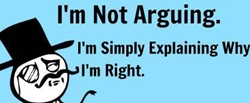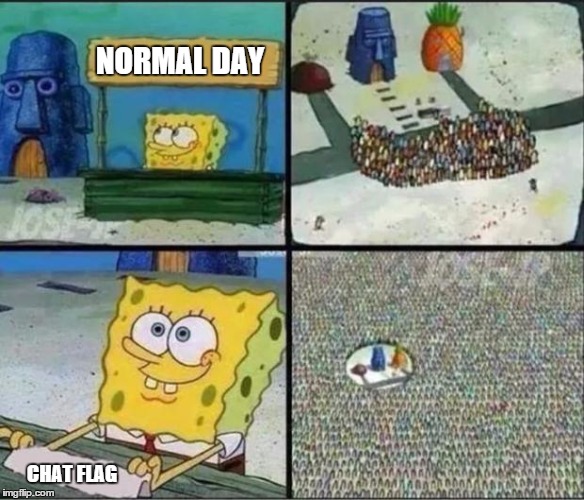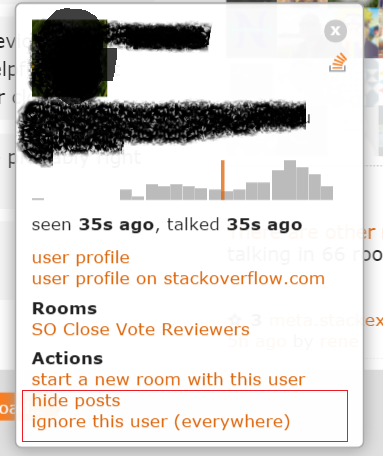TL;DR: The Problem
This keeps happening in chat:
- Surprise at flags on vulgar messages. Language that would invariably get your comments deleted on the main site occasionally gets flagged and deleted in chat. Confusion reigns.
- Controversial topics leading to bickering and name-calling. Folks bring up polarizing topics in rooms dedicated to other topics and filled with people who joined for the same. Anger and resentment ensues.
- Moderators step in to try and resolve #1 or #2. Who elected them to solve our problems? Indignation follows.
These are inherently social problems; the first step toward addressing them is better communication. Therefore, I propose that we begin by re-writing the chat FAQ in an effort to clarify WHAT chat is for and HOW it can be used constructively.
I'll begin by laying out my own observations regarding chat...
Background
For five years now, Chat has been the red-headed stepchild of Stack Overflow and Stack Exchange: not a particularly good fit for a Q&A site, but still an integral part of the experience for many.
During this time, we've had some... Divergent evolution, so to speak: the perception of chat among the minds of those who use it has taken on different forms, and the perception of chat among those who don't regularly use it is something else again. This has led to problems.
Jeff envisioned chat as a "third place":
I think a web-based real time chat system like Campfire could offer that informal public gathering third place -- a space for people who love the topic to meet, discuss, and collaborate in a different way. It would foster community, and be complementary to both strict Q&A;, and meta-discussion.
This is essentially chat's charter, both the reason for its existence and the hope for what it would become. Over the years, folks have used a lot of different metaphors to describe chat: the watercooler (informal work conversations), the tavern (socialization after work), etc. These metaphors work, to a degree... But they also leak when stretched too far: you can't have 20 people all gathered around one jug of water, and rarely does anyone talk to everyone crowded into their local inn, much less expect them to listen and respond constructively. Yet, these scenarios are common in chat. And these forms of social interaction are the source of the problems described above, which cannot easily be resolved with fanciful comparisons to physical gathering-places.
I hold that the problems which arise in chat are rarely those of topic or language, although that is often how they appear; rather, the persistent problem in chat is participants who hold expectations for how they or others should behave which don't match the reality of either the system or the larger culture in which it resides. One does not repeatedly charge into a brick wall thinking it will move aside; one does so believing that the wall does not exist.
The actual nature of chat on Stack Overflow / Stack Exchange
These are incontestable facts:
- Chat is not IRC: conversations are permanent by default, public by default, and linked to your main-site user account by default.
- Chat is user-moderated: flaggers, privileged users and elected moderators all participate in deciding what is allowed and what is not.
- Chat is moderated: there are no "anything goes" chat rooms; all moderation tools and privileges operate in all rooms.
These facts imply a few things that are not always obvious:
- Chat is not transient: what you say tonight while drunk still exists, in public and attached to your account, tomorrow.
- Chat is not separate from Q&A: you have to participate on the main sites to establish an account that even allows you to chat; you earn the chat privilege on main, and can lose it there as well.
- You can't control who reads what you write in chat: transcripts are completely public, open to anyone, even people who aren't visible in chat, even people who aren't members of the main Q&A site. Your boss, your wife, your worst enemy, that annoying kid from 6th grade... They could all be reading your chat logs at their leisure, potentially even years after the fact.
Taken as a whole, these factors make chat well-suited as an auxiliary to the asking and answering that happens on the main Q&A sites... But poorly suited to many other roles, even roles that other chat systems commonly serve! I believe it is essential that we communicate these factors within the guidance given to chat participants, and do what we can to dissuade them from relying on chat for purposes they will find it ill-suited for.
Communicating the nature of chat
I said at the start that my primary goal here is to re-write the guidance that is given to folks using chat; indeed, several of my co-workers are already hard at work on this. As such guidance must necessarily be grounded in a shared understanding of the nature and purpose of the system itself, and that starts here: I've laid out my observations above; now, what have I overlooked?
Note that there are several outstanding technical issues with both flagging and room membership... If you're interested in these issues, please participate in the relevant feature-requests.



